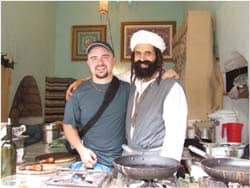The process of conversion was extensive and involved a lot of very hard work on my part, but the actual rituals involved were not particularly onerous. For men, Jewish law requires circumcision, but men who have been circumcised as infants need only to have a small drop of blood drawn from the circumcision site, and thankfully (!) I was in this category. Appearance before a beit din, a court convened to examine the potential convert's readiness to become a Jew, is required for men and women. For those who view Jewish law as binding upon all Jews, conversion means in an instant becoming responsible for living in accordance with its demands, and the beit din makes sure the candidate is ready to do so. Both men and women then immerse in a mikvah, a ritual bath, and they become Jews with this act. It is difficult to describe the happiness I felt when I was greeted by my friends from the synagogue as a new member of the Jewish people, embraced by them as such. I felt I had finally come home, and been connected with who I always was.
I have been heavily involved in my Jewish community since my conversion. I currently serve as a gabbai in our synagogue, a sort of assistant during services. I also lead services when the rabbi is away, and I tutor bar and bat mitzvah students on chanting Torah and Haftarah. I also have been involved in speaking engagements outside of the Jewish community where I have taught church groups and college classes about Judaism, Israel, and related topics. I have completely fallen in love with my people, and every opportunity I have to serve other Jews and work to bridge our community with others is a reward in itself.
 This is not to say there have not been trying times and speed bumps along the way, and the hurdles I have encountered are not uncommon among converts to Judaism.
This is not to say there have not been trying times and speed bumps along the way, and the hurdles I have encountered are not uncommon among converts to Judaism.
Because becoming a Jew means joining a cultural group and a people just as much as it is taking on the Jewish religion, one essentially develops a new identity in the process of preparing for conversion. Becoming Jewish is about more than going to the synagogue and praying from a siddur, or prayerbook. It also means acquiring the ability to navigate Jewish culture, to be moved by collective experiences of a group into which one was not born.
There are new memories to forge, new ways of seeing the world develop, and the Hebrew language to learn. Not everyone in a potential convert's family of origin will understand this. I still find the members of my own extended family taken aback when they are at my home and they walk into a room to find me praying in a tallit and tefillin; this awkwardness says nothing of how we relate to one another given their views on the consequences of my having rejected Christianity. Family members will not always understand the changes in your life, and becoming a Jew is a very significant change.
Another issue confronting those interested in becoming Jews is that there isn't really a universally accepted route. The Reform movement recognizes converts from any stream of legitimate Judaism (excluding "Messianic Judaism," which is actually Christianity), and Conservative Judaism does as well, so long as the requirements of Jewish Law have been met. Orthodox communities typically only recognize Orthodox converts; yet it is true that some Orthodox communities will not recognize converts from other Orthodox communities either.
The issue of acceptance is compounded by the fact that the State of Israel recognizes all converts as Jews for purposes of citizenship, but the religious authorities in the Israeli Chief Rabbinate do not. Where you will be accepted as Jewish is an important consideration for prospective converts, and having experiences in which you are rejected can be quite painful, given the difficulty of the conversion process and the commitment it requires. My advice is to choose the Jewish community in which you want to involve yourself, and make your conversion there where you will be accepted.
Finally, it is worth noting that becoming a Jew means you will be subject to the fate of Jews where you live, for good or ill. Jews have experienced an enormous amount of persecution throughout our history, and wherever there are Jews there are hateful and maladjusted people who for whatever reason have something against us. You will also become a person to whom many non-Jews will look for explanations of the "Jewish" perspective on issues of all kinds, and I have often found myself being forced to engage in arguments about Judaism with Christians eager to convert Jews, and about Israeli political and defense issues. Suffice it to say that it is important that any decision to convert to Judaism includes a serious consideration of these issues and how they will impact you.




